Understanding the Bible Commentary Series: New Testament (18 vols.)
Digital Logos Edition
This is the rebranded version of the New International Biblical Commentary: New Testament. It contains all the same content.
Overview
This user-friendly commentary series helps any reader navigate the Bible’s sometimes-difficult terrain. Each of the 18 volumes breaks down the barriers between the ancient and modern worlds, revealing the power and meaning of the biblical texts to contemporary readers.
The contributors tackle interpretation using the full range of critical methodologies and practices—yet they do so as people of faith who hold the text in the highest regard. They present a careful section-by-section exposition of the biblical books with highlighted key terms and phrases and transliterated Greek words. Notes at the close of each chapter provide additional textual and technical comments for those who want to dig deeper. A bibliography, as well as Scripture and subject indexes, is also included.
Want more of this series? Order Understanding the Bible Commentary Series: Old Testament (18 vols.) today! Or, get an even better deal with the combined collection, Understanding the Bible Commentary Series (36 vols.).

- Provides section-by-section commentary
- Contains additional study notes at the end of each chapter
- Includes suggestions for further reading and Scripture and subject indexes in each volume
- Title: Understanding the Bible Commentary Series: New Testament
- Publisher: Baker
- Volumes: 18
- Pages: 5,728
This title is included in the following collections
You can save when you purchase this product as part of a collection.
Understanding the Bible Commen...
$499.99$499.99Baker Ultimate Collection 2022...
$38,273.89$30,599.99
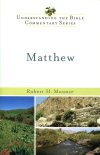
This volume reveals how Matthew developed and delivered five main teaching emphases that simultaneously gave the growing early church a rich and complete understanding of Jesus’ sayings and demonstrated how he fulfilled many messianic prophecies.
Robert H. Mounce . . . is a gifted educator and communicator. He blends scholarship with exposition, and the result is consistently helpful for study, encouraging for sermon or lesson preparation, and a personal blessing for those desiring to grow in understanding God’s word. . . . Mounce offers insight as well as refreshment.
—Book News and Notes
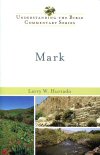
This volume transports modern readers back to the days of Mark’s original audience and helps us to understand and apply his unique writing and challenges to the church. Very possibly the oldest written account of the ministry of Jesus that we possess, the Gospel of Mark is a vivid and fast-paced narrative of the Good News about Jesus.
Hurtado has an excellent feel for Mark, focusing especially on the theological meaning of the gospel. He is surefooted in exposition of difficult passages, refusing to get bogged down in detail but at the same time refusing to provide a superficial answer. . . . The high quality of Hurtado’s scholarship shines through his engaging prose.
—K. E. Brower, senior lecturer in biblical studies, Nazarene Theological College
Larry W. Hurtado is an emeritus professor of New Testament language, literature, and theology and emeritus director of the Centre for the Study of Christian Origins at the University of Edinburgh in Scotland. An internationally respected New Testament scholar, he is an expert on the Gospels, the apostle Paul, early Christology, the Jewish background of the New Testament, and New Testament textual criticism.
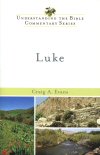
Packing a lot of historical detail into a small space, Luke is a perfect introduction to this beautiful and theologically rich Gospel. The clear writing and logical explanations help you understand Luke’s difficult passages and the scholarly discussions about them.
Craig Evans’ volume on Luke is a model of the series. The writer is as aware of the main questions which dominate Lucan scholarship today as he is of its methods and useful findings.
—Max Turner, emeritus professor of New Testament, London School of Theology
This commentary fulfils the aims of the series in an admirable way. . . . The presentation of the major themes and emphases is concise and well done. Because of contemporary controversies there is a special section on the problem of the supposed anti-Semitic aspects of Luke. . . . [Craig Evans] shows his mastery of Lucan study. . . . The commentary ought to be in all theological libraries.
—P. M. Meagher, Institute of Religious Studies
Dr. Craig A. Evans received his PhD in New Testament from Claremont Graduate University and his DHabil from the Karoli Gaspar Reformed University in Budapest. He is the John Bisagno Distinguished Professor of Christian Origins at Houston Baptist University in Texas.
Evans taught at Trinity Western University in British Columbia for 21 years, where he directed the graduate program in biblical studies and founded the Dead Sea Scrolls Institute. He has recently served on the advisory board for the Gospel of Judas for National Geographic Society and has appeared frequently as an expert commentator on network television programs.
Evans has written and edited extensively on the historical Jesus and the Jewish background of the New Testament era. His published works include From Prophecy to Testament, Jesus and the Ossuaries, Jesus: The Final Days, and Dictionary of New Testament Background.
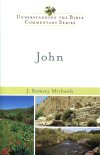
John the apostle, the last of the original 12, writes the final and most spiritual of the four Gospels. His intention is to clearly announce that Jesus is the eternal Son of God who has come in the flesh to redeem the world. This volume unpacks and explains the beautiful and rich signs and symbols that John used so that “you may believe that Jesus is the Christ, the Son of God, and that by believing you may have life in his name.”
J. Ramsey Michaels is emeritus professor of religious studies at Missouri State University, Springfield. He has taught New Testament at Gordon-Conwell Seminary, Fuller Seminary, and most recently, Bangor Seminary. Michaels has written commentaries on 1 Peter, Revelation, Hebrews, and John.
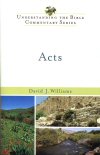
Acts leaves no stone unturned as it brings every feature of interest and debate about the book of Acts to our attention. Careful and accurate, this incisive exploration of Luke’s account of the events following the resurrection will shed light on cultural and political realities at the time the church was in its infancy.
Williams has left virtually no stone unturned in his attempt to bring every feature of interest and debate to the reader’s attention . . . this well-written commentary is recommended to all, teacher and student alike.
—Craig A. Evans, Payzant Distinguished Professor of New Testament, Acadia Divinity College
David J. Williams served as the vice principal of Ridley College, University of Melbourne. His publications include The Promise of His Coming and Paul’s Metaphors.
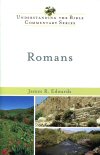
Romans is a towering epistle and arguably Paul’s most difficult letter to understand and interpret. This volume clearly shows the goodness of God as displayed in his righteousness revealed in Christ for our salvation. Enjoy this edifying journey through the most logical and doctrinally oriented of Paul’s letters.
James Edwards . . . has written the commentary I have been looking for: an exposition of the English text of Romans that takes account of the latest scholarship, refuses to duck the tough theological questions that keep popping up in Romans, and communicates in uncluttered English and effective illustrations.
—Critical Review of Books in Religion
James R. Edwards is the Bruner-Welch Professor of Theology at Whitworth University. He is a member of the Center of Theological Inquiry in Princeton.
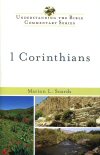
1 Corinthians is a clear, up-to-date, and thoroughly understandable treatment of Paul’s letter to the church at Corinth, focusing attention on what the text actually means rather than scholarship about the text. It addresses many relevant issues, including sexual immorality, religious diversity, and the false teaching among leaders in Corinth. It also sheds light on how that culture affected the early church, revealing how many of those persistent problems are still faced by Christians in the world today.
Soards’ commentary is a clear, up-to-date, balanced, religiously sensitive treatment of 1 Corinthians. Aimed at the general reader, it will find a welcome home in college and seminary classrooms and in the pastor’s study.
—Charles H. Talbert, distinguished professor of religion, Baylor University
This commentary is solid but readable, welcoming yet challenging. It focuses attention on the biblical text rather than on scholarship about the text. This commentary should be the first one students read when studying 1 Corinthians.
—Alan Culpepper, dean, McAfee School of Theology, Mercer University
Here is a commentary abreast of contemporary scholarship communicated in a readable style. It fulfills the goal of the series for which it is written. I recommend it for college and seminary students.
—Restoration Quarterly
Marion L. Soards is a professor of New Testament studies at Louisville Presbyterian Theological Seminary. The author of more than 20 books, he is active in a number of scholarly societies and associations, and he has published dozens of articles and reviews in leading theological dictionaries and professional journals worldwide.
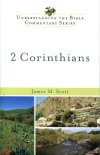
The apostle Paul writes a letter to the church in Corinth that defends his calling and exhorts unity through love as the church collects gifts for believers in Jerusalem. He also helps us understand and act on the truth that Christianity does not renounce and forsake the world but, in love, renews it. This commentary offers an in-depth look at this letter full of reconciliation and harmony.
Don’t be fooled by its size! Scott’s commentary is to the point, clearly written, and filled with provocative proposals for reading this complex letter. From the centrality of Paul’s self-understanding and the unity of the letter to merkabah mysticism, Korah’s rebellion, and the Jewish concept of the nations, Scott’s reading rightly reminds us of just how Jewish the Apostle to the Gentiles was and of how much we must know his milieu to understand his message! Here is an insightful introduction to both the influences and intent of 2 Corinthians.
—Scott J. Hafemann, St. Mary’s College, University of St. Andrews
James M. Scott is a professor of religious studies at Trinity Western University. He is the author of Paul and the Nations, Adoption as Sons of God, and Exile.
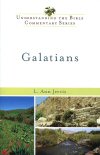
Paul’s letter to the church in Galatia is among the most riveting, personal, and persuasive of the apostle’s writings. This volume provides delightful insights into Paul’s mission-minded heart by detailing the many ways he asserts adherence to the gospel of Jesus and by pointing out his opposition to the false gospel of his adversaries.
An informed, perceptive, and readable exposition of Galatians—a truly excellent introductory commentary for ‘the Christian community at large,’ which is its intended audience.
—Richard N. Longenecker, distinguished emeritus professor of New Testament, McMaster Divinity College
The most helpful contribution that this commentary brings to its intended audience is its concise and even-handed introduction. Jervis addresses the situation and opponents and the date and audience options in a way that would be very helpful for a lay Bible reader who might otherwise be overwhelmed by the competing theories expressed in a more technical commentary. . . . Another feature that adds value to the commentary is the additional notes contained at the end of each section. These notes reflect Jervis’ expertise in the field, and often include excellent exegetical comments, added background information, helpful bibliographic references, and surveys of the various ways in which a phrase or verse have been interpreted. . . . In the end Jervis’ commentary is a very concise, well-written and reliable exposition of the ‘New Perspective’ approach to Galatians.
—Ashland Theological Journal
L. Ann Jervis is a professor of New Testament at Wycliffe College and Trinity College. She is the author of The Purpose of Romans and coeditor of The Gospel in Paul.
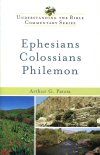
Ephesians, Colossians, Philemon discusses the origin, authorship, purpose, and contents of these New Testament letters. Scholarly, yet easy to understand, this volume explores the nuances of Paul’s messages to the church, which deal with many of the same issues faced by the church today.
Arthur Patzia is the former senior professor of New Testament at Fuller Theological Seminary, Northern California, and in retirement serves as an adjunct professor. A distinguished scholar, he is the author of several books, including The Making of the New Testament, The Emergence of the Church, and the Pocket Dictionary of Biblical Terms.
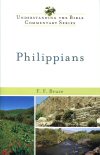
The letter from Paul known as the ‘epistle of joy’ is a thank-you note to the believers at Philippi for their help in his hour of need. It provides instruction on Christian unity. His central thought is simple: only in Jesus are real unity and joy possible. This commentary pulls the rich truth from this letter and makes it live for us today.
This is a valuable commentary. . . . I find [F. F. Bruce’s] exposition and exegetical/philological judgments and comments very competent and insightful. He is very fair and gives the opinion of others in detail while he justifies his own judgments with good argumentation.
—P. M. Meagher, Institute of Religious Studies
F. F. Bruce (1910–1990) was a lecturer in Greek at the Universities of Edinburgh and Leeds, then head of the new Department of Biblical History and Literature at Sheffield University. He was the Rylands Professor of Biblical Criticism and Exegesis at the University of Manchester from 1959 until his retirement in 1978.
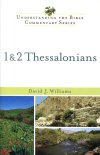
In 1 and 2 Thessalonians, you will find a concise and clear explanation of Paul’s letters to the church in Thessalonica. Written from an evangelical perspective, this commentary explains the significance of Greek terms in order to bring out the fullness of the Apostle Paul’s heart and the relevant applications to our everyday lives.
Dr. Williams has given us a fine commentary on the Thessalonian correspondence. He writes explicitly for the general reader but that does not mean that he has overlooked difficult or controversial passages. He deals with them simply in a way that we can all understand. A feature of the commentary is the way the author takes pains to explain the significance of Greek terms and thus to bring out the force of what the Apostle has written. Dr. Williams writes simply and clearly and he has put us all in his debt.
—Leon Morris, former principal, Ridley College
David J. Williams was educated at the University of Melbourne and Fuller Theological Seminary and served as the vice principal of Ridley College, Melbourne. His publications include The Promise of His Coming and Paul’s Metaphors.
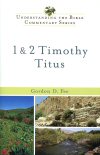
1 and 2 Timothy, Titus explores Paul’s heartfelt concern for the newly planted churches and the leaders who served in them. These letters of compassion, instruction, and admonition were meant to instruct and strengthen the leaders and the members of these churches. Filled with great insight taken from the original language, this volume will help you understand more deeply the pastoral love of Paul.
[Fee’s commentary on 1 and 2 Timothy, Titus] . . . is ideal for students, pastors, and teachers. It is a model of clarity and organization and consistently reflects a judicious examination of exegetical issues. Indeed . . . I think it is one of the best available [commentaries] on the Pastoral Epistles. Fee’s skill in writing commentaries is as evident in this volume as it was in his magisterial volume on 1 Corinthians.
—Thomas R. Schreiner, James Buchanan Harrison Professor of New Testament Interpretation, The Southern Baptist Theological Seminary
Gordon D. Fee is an emeritus professor of New Testament studies at Regent College in Vancouver, British Columbia. He is the author of several books, including the popular How to Read the Bible for All Its Worth, as well as many commentaries.
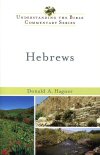
This commentary reveals the true purpose of the book of Hebrews: to exhort and encourage Jewish Christians to remain faithful to Jesus and not to turn back to Judaism. These words of comfort—intended to help early believers to hold fast to the Christian hope without wavering in the face of persecution, ridicule, and insults—contain lessons that can guide our own faith today.
Of all the major New Testament books none perhaps stands in greater need of elucidation and exposition for the modern reader than the letter to the Hebrews. It is therefore an occasion of much interest to the Bible-reading public that such a volume as Dr. Hagner’s . . . is on hand to assist them. . . . His writing shows that he is en rapport with the epistle, determined to let it speak its own relevant message to those who wonder how the Jewish messiah can be the world’s redeemer, and anxious to help those who find this part of the New Testament strange and forbidding.
—Ralph P. Martin, distinguished scholar in residence, Fuller Theological Seminary
Donald A. Hagner is the George Eldon Ladd Professor Emeritus of New Testament and senior professor of New Testament at Fuller Theological Seminary in Pasadena, California. He is the author of Encountering the Book of Hebrews, The Jewish Reclamation of Jesus, New Testament Exegesis and Research: A Guide for Seminarians, and commentaries on Hebrews and Matthew. He is also coeditor of the New International Greek Testament Commentary and an ordained minister in the Presbyterian Church (USA).
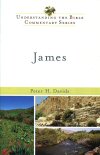
Discover how believers in the early church understood and applied the words of Jesus to their daily lives in this insightful exposition of the hard-hitting and practical Epistle of James. This book uncovers the beautiful harmony between faith and works, showing each to be an essential aspect of the Christian life.
Peter H. Davids is a visiting professor in Christianity at Houstin Baptist University. He has taught in seminaries and universities in Germany, Austria, the USA, and Canada, among other countries. He has written multiple commentaries and books on James, 1 Peter, and 2 Peter–Jude and coedited the Dictionary of the Later New Testament.
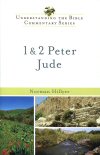
In 1 and 2 Peter, Jude, you will find a concise and incisive exegesis of the Petrine epistles and Jude, even of difficult verses. Written from an evangelical perspective, this commentary brings into focus a wealth of background information from the Old Testament, Jewish intertestamental works, and other literary sources to illuminate the letters of Peter and Jude.
Hillyer’s commentary on the Petrine epistles and Jude is both concise and incisive even in its exegesis of difficult verses. His volume, written from an evangelical perspective and based on the NIV, is most appropriate as a text for undergraduate biblical students and as a supplement to personal Scripture reading for educated laity. . . . Another value of this commentary is the wealth of background that the author brings to the letters from the Old Testament, Jewish intertestamental works, and other literary sources.
—Themelios
Norman Hillyer is a minister who served churches in London, Surrey, Hertfordshire, and Devon. He has also worked as the librarian at Tyndale House, Cambridge, and contributed to the New International Dictionary of New Testament Theology.
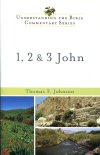
These three letters from the apostle John are personal, pastoral, and passionate pleas for the church to remain united and strong in the face of persecution. They are also treasured for their memorable teaching on love and forgiveness. Discover the evidence of what the true Christian life looks like, what true Christian care consists of, and what constitutes genuine leadership in the church.
Thomas F. Johnson is an interim academic dean at Trinity Lutheran College.
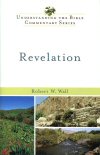
As the author of this commentary explains, the very first word of John’s composition, “revelation,” is an essential clue for the interpreter of Revelation. The primary intent of this literature is to reveal the “mysteries of God” to believers presently experiencing oppression and suffering. This commentary will help you discover the meaning behind the complex ideas and images found in this last book of the Bible.
Wall’s commentary is a valuable contribution to the study of Revelation. It interacts well with most of the leading contemporary scholarship in the field. It provides an angle of perspective on John’s vision that opens some new vistas into its meaning and provides healthy correctives of many misconceptions. This is a useful resource for college and seminary classes on Revelation and a helpful tool for those with theological/biblical training who would lead Bible studies on Revelation.
—M. Robert Mulholland Jr., Professor of New Testament, Asbury Theological Seminary
Robert W. Wall is the Paul T. Walls Professor of Scripture and Wesleyan Studies at Seattle Pacific University. In addition to his commentary on Revelation, he has authored numerous journal articles and several books, including commentaries on Colossians/Philemon, James, Acts, and the Pastoral Epistles.
Reviews
11 ratings

Daniel Stengård
12/14/2022
Dwayne Campbell
9/27/2018

Ralph A. Abernethy III
9/7/2017
Justin Renton
10/8/2015

Dustin Payne
9/27/2014

Michael Herbert, M.Div., Pastor
4/8/2014

Wild Eagle
10/21/2013
Eduardo Vega
9/25/2013

Raymond Sevilla
7/19/2013
J.R. Woods
4/18/2013
This set is simply Phenomenal--the authors are the best bar-none=FF Bruce, Craig Evans, Donald Hagner...there is simply no set, none, that you will find this stacked on scholarship for this price. There is simply none.